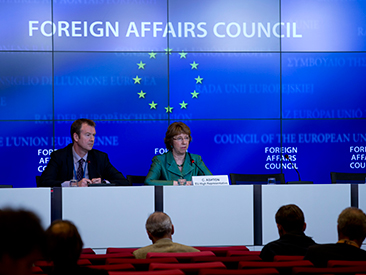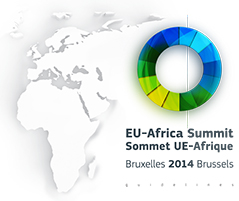Foreign Affairs Council: EU Foreign Ministers reiterate support for Ukraine

The crisis in Ukraine dominated discussions by EU Foreign Ministers in Luxembourg on 14 April at the Foreign Affairs Council. The monthly meeting, which is chaired by EU High Representative Catherine Ashton, also discussed Syria and Bosnia and Herzegovina among several issues. In a joint statement, Ministers condemned actions undertaken by armed individuals in cities of Eastern Ukraine and said that attempts at destabilising Ukraine must come to an end. The Council also decided to expand the list of those subject to asset freeze and visa ban.
Ministers also reiterated their strong support for Ukraine's unity, sovereignty, independence and territorial integrity, and called upon Russia to do likewise. It demanded Russia to call back its troops from the Ukrainian border and immediately withdraw the mandate of the Federation Council to use force on Ukrainian soil.
Catherine Ashton said afterwards that "any further action aimed at destabilising Ukraine must stop. It is crucial that Russia and Ukraine engage in a meaningful dialogue to find a political solution."
She went on say that the on the ground "free and fair Presidential elections on 25 May are the best way to express the will of the citizens, as is the process of constitutional reform."
Ashton will meet the Foreign Ministers of the United States, Russia and Ukraine this Thursday 17th April in Geneva. The purpose of this meeting is to start a dialogue on how to deescalate the situation in Ukraine and to ensure that peace and stability returns to the whole of Ukraine.
The Council also signalled that the EU is ready to assist Ukraine in the field of civilian security sector reform. All options will be examined, including a possible mission under the Common Security and Defence Policy, and a decision will be taken at the next Foreign Affairs Council.
Financial support to Kyiv
In addition, the Council approved macro-financial assistance to Ukraine to support the country's economic stabilisation and reforms. A total of €1 billion will be made available to contribute to covering Ukraine's urgent balance-of-payments needs as identified in the government's economic programme supported by the International Monetary Fund (IMF). This brings the total amount to € 1.6 billion.
The Council also adopted temporary tariff cuts on Ukrainian goods, ahead of the application of the Association Agreement. The reduction of customs duties is expected to enter into force on 23 April.
The Council moreover strengthened EU sanctions against persons responsible for misappropriating Ukrainian state funds and targeted four additional persons in Ukraine with an asset freeze.
"Appalling" Syria situation: Political solution the only way forward
The situation in Syria was also discussed. Speaking after the meeting Catherine Ashton said that "we have had a long and very important Council meeting which began with discussion about the situation in Syria which I can only describe as appalling. We of course continue to support the efforts of (Joint Special Representative) Lakhdar Brahimi as he seeks to try moving forward in the political process. And we will continue in our diplomatic outreach on Syria, to ensure that all our partners remain engaged."
On the humanitarian side she said "we believe it is up to the regime to ensure tangible and long-lasting improvements in that situation, especially on humanitarian aid. We want to insure that the deadline for destruction of chemical weapons is kept to the 30th of June. This is of extreme importance. And we also recognise the importance of support for the neighbours of Syria. We want to help them as they manage, looking after refugees, and will continue with our aim in giving support to those countries as well as to the internally displaced people in Syria."
Important to reinvigorate political (Geneva) process
In their statement following the meeting EU Foreign Ministers said that the EU reiterates that there can only be a political solution to the conflict in Syria that has now lasted for more than three years and underscores the importance of reinvigorating the Geneva process. The regime's constant obstruction of the talks, its decision to list members of the opposition negotiating team as terrorists, and its rejection of the Geneva Communique led to the failure of the two first rounds of the negotiations.
Ministers also urged those with influence on the Syrian regime to put pressure on it to engage much more constructively in the talks. The EU commends the attitude of the opposition delegation led by the National Coalition of Syrian Revolutionary and Opposition Forces (SOC) throughout the negotiations and welcomes their continued commitment to the political process.
Bosnia and Herzegovina: People "need to be given new opportunities"
After the meeting Catherine Ashton told the press that "we also discussed the situation in Bosnia and Herzegovina and the socio-economic as well as political challenges they are facing. The first responsibility to deal with them lies with the leadership of the country and we call upon them to provide concrete and quick answers to the legitimate concerns and aspirations of the people. Ahead of October elections, more, not less, needs to be done."
She went on to say "in the short term it is important for the institutions and leaders in Bosnia and Herzegovina to focus on a number of key priorities, particularly socio-economic issues and especially high unemployment among young people. We are ready to support the efforts they make through a number of initiatives, including the Compact for Growth. This is an effort coordinated with international partners to assist the institutions in Bosnia and Herzegovina in reforming the economy and creating new opportunities for citizens."
In their conclusions after the meeting EU Foreign Ministers reaffirmed their unequivocal commitment to the territorial integrity of Bosnia and Herzegovina as a sovereign and united country. The Council also reiterates its unequivocal commitment to Bosnia and Herzegovina's EU perspective. In this regard, it condemns as unacceptable secessionist and divisive rhetoric and ideas.
In line with its conclusions of December 2013, Ministers recalled its serious concern that the EU integration process in Bosnia and Herzegovina (BiH) has stalled due to the lack of political will on the part of the BiH politicians and the continued use of divisive rhetoric. As other countries of the region make progress, Bosnia and Herzegovina is lagging behind.
Ministers said they had heard the public protests and calls by BiH citizens to improve the social and economic situation in the country. All BiH citizens, including the younger generation, need to be given new opportunities. It strongly urges the BiH institutions and elected leaders to reach out to the people, engage with civil society and provide responsible and immediate answers to their legitimate concerns. The Council emphasizes that it is the collective responsibility of all BiH political leaders. Ahead of the general elections in October 2014, more needs to be done, not less.
Links
Conclusions of April's Foreign Affairs Council ![]()
Catherine Ashton speaking after the Foreign Affairs Council ![]()
Photos from the Foreign Affairs Council






